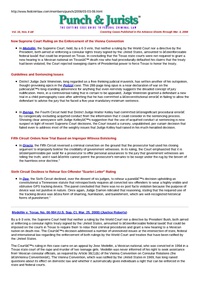In U.S. v. Ibanga, 454 F.Supp.2d 532 (E.D.Va. Oct. 5, 2006) (P&J, 09/04/06) (“Ibanga I”), Judge Walter Kelley thoughtfully explained why he felt that acquitted conduct should no longer be used at sentencing now that Booker mandates that the provisions of 18 U.S.C. § 3553(a) guide sentencing decision-making. He …
Here the Court granted a defendant a new trial in a child pornography case after admitting that he has committed a “constitutional error” in failing to allow the defendant to advise the jury that he faced a five-year mandatory minimum sentence.
Throughout his illustrious career, District Judge Jack …
In this consolidated appeal, two defendants sought review of their sentences which were imposed by the United States District Court for the District of Arizona and the United States District Court for the District of Idaho. After the Ninth Circuit affirmed the sentences imposed in two separate appeals, reported …
Here the Court reversed a criminal conviction on the ground that the prosecutor had used his closing argument to improperly bolster the credibility of government witnesses, emphasizing that such conduct is "impermissible per se".
In a rare ruling, a panel from the Fifth Circuit reversed a criminal conviction …
Sentence based on guilty plea to securities fraud and conspiracy to commit securities fraud is affirmed over defendant's claims that: 1) the imposition of special conditions of supervised release relating to his prior sex offenses exceeded the district court's statutory authority and violated the Double Jeopardy Clause and the …
The defendant in this case had previously has been convicted of aggravated assault on a corrections officer, lewd and lascivious acts with a child under the age of 14, annoying children and trespassing. The district court found him incompetent to stand trial. The government requested to medicate defendant involuntarily …
In Doe v. Bredesen, 507 F.3d 998 (6th Cir. Nov. 16, 2007) (P&J, 10/15/07) (“Doe I”), a divided panel from the Sixth Circuit concluded that a new Tennessee law that required all convicted sex offenders to wear a new GPS tracking device did not violate the Ex Post Facto …
Here the Court held that neither a ruling by the World Court nor a directive by the President, both aimed at enforcing a consular rights treaty signed by the United States, amounted to “enforceable federal law” that could be imposed on Texas.
By a 6-3 vote, the Supreme …
Order resentencing defendant following his guilty plea to conspiring to distribute and possess with intent to distribute over one thousand kilograms of marijuana is vacated where the court violated: 1) defendant's right to be present at resentencing; 2) his right to notice that the court intended to impose an …
In this case, the ACLU sought release of what it identifies as court orders and government pleadings regarding a program of surveillance of suspected international terrorists by the National Security Agency (NSA) that had previously been conducted without court authorization. Its motion requested that "all such documents . . …
